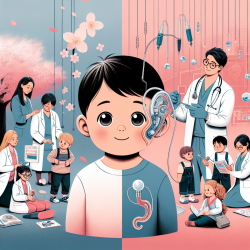Unlocking Potential: Utilizing Postnatal Factors to Enhance Autism Spectrum Disorder Interventions

Autism Spectrum Disorder (ASD) presents unique challenges that necessitate data-driven and evidence-based approaches to create optimal outcomes for children. Recent research, particularly the study titled "AUTISM SPECTRUM DISORDER AND POSTNATAL FACTORS: A CASE-CONTROL STUDY IN BRAZIL," offers valuable insights that practitioners can leverage to improve their therapeutic interventions. This blog aims to distill the key findings of this research and suggest actionable steps for practitioners working with children diagnosed with ASD.
Understanding the Research
The Brazilian study examined the association between ASD and various postnatal factors. Conducted with 253 individuals diagnosed with ASD and 886 without signs of the disorder, the study utilized a semi-structured questionnaire and multiple logistic regression models to analyze the data. The key postnatal factors identified include:
- Congenital malformation (Odds Ratio [OR] 4.24)
- Neonatal jaundice (OR 1.43)
- Absence of crying at birth (OR 1.97)
- Seizure episodes in childhood (OR 5.75)
Additionally, the study found that the magnitude of the association was higher in children who experienced two or more postnatal complications (OR 6.39).
Actionable Steps for Practitioners
Given these findings, practitioners can enhance their therapeutic strategies by focusing on the following areas:
1. Early Identification and Monitoring
Identifying children at risk due to postnatal complications can lead to earlier interventions. Practitioners should:
- Screen for congenital malformations and monitor developmental milestones closely.
- Track neonatal jaundice and ensure appropriate management to mitigate potential neurodevelopmental impacts.
- Be vigilant about respiratory issues at birth, particularly the absence of crying, and follow up with thorough developmental assessments.
- Monitor for seizure activity and collaborate with neurologists to manage and treat these episodes effectively.
2. Comprehensive Assessments
Implementing comprehensive assessments that consider these postnatal factors can improve diagnostic accuracy and intervention planning. This includes:
- Utilizing standardized screening tools and questionnaires that incorporate questions about birth and neonatal history.
- Engaging multidisciplinary teams to provide a holistic view of the child's developmental needs.
3. Personalized Interventions
Tailoring interventions based on the specific postnatal factors identified can lead to more effective outcomes. Practitioners should:
- Develop individualized education plans (IEPs) that address specific challenges related to congenital malformations, jaundice, and other identified factors.
- Incorporate strategies that support sensory processing, communication, and social interaction, which may be impacted by early neurological complications.
4. Family Education and Support
Educating families about the potential impact of postnatal factors and providing support can empower them to advocate for their child's needs. This includes:
- Offering resources and training on recognizing early signs of developmental delays.
- Providing guidance on navigating healthcare and educational systems to ensure their child receives comprehensive care.
Encouraging Further Research
While the findings of this study are significant, they also highlight the need for further research, particularly in diverse populations. Practitioners are encouraged to:
- Participate in and support research initiatives that explore the interplay between genetic and environmental factors in ASD.
- Collaborate with researchers to share clinical observations and outcomes, contributing to a broader understanding of ASD etiology.
By integrating these evidence-based strategies into their practice, practitioners can make a meaningful difference in the lives of children with ASD. The insights gained from the Brazilian study provide a valuable framework for improving diagnostic accuracy, tailoring interventions, and supporting families through the complexities of ASD.To read the original research paper, please follow this link:
AUTISM SPECTRUM DISORDER AND POSTNATAL FACTORS: A CASE-CONTROL STUDY IN BRAZIL.
Citation: Maia, F. A., Oliveira, L. M. M., Almeida, M. T. C., Alves, M. R., Saeger, V. S. A., da Silva, V. B., de Oliveira, V. S. D., Martelli, H. Jr., Brito, M. F. S. F., & da Silveira, M. F. (2019). Autism spectrum disorder and postnatal factors: A case-control study in Brazil. *Revista Paulista de Pediatria, 37*(4), 398-405. https://doi.org/10.1590/1984-0462/;2019;37;4;00006










